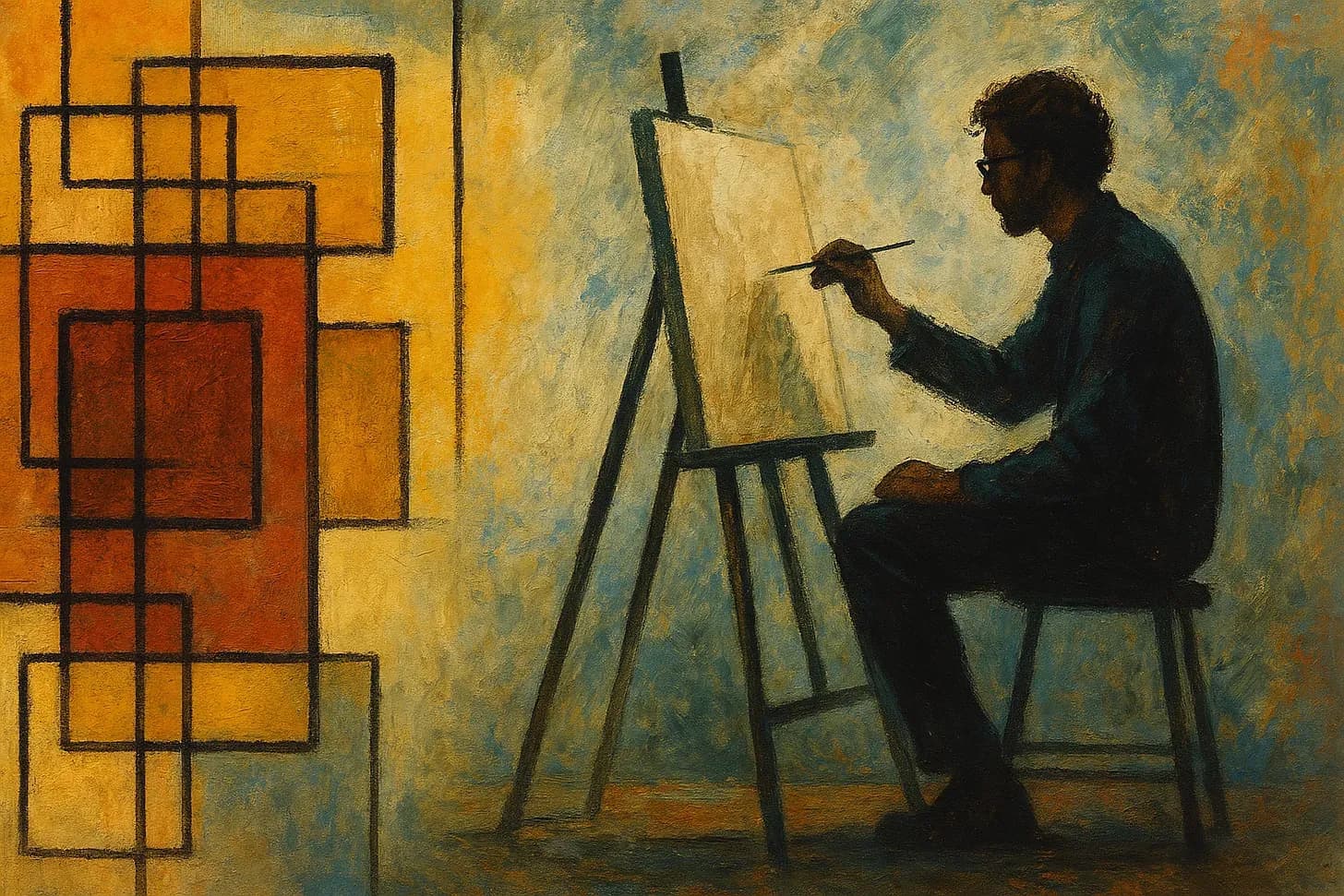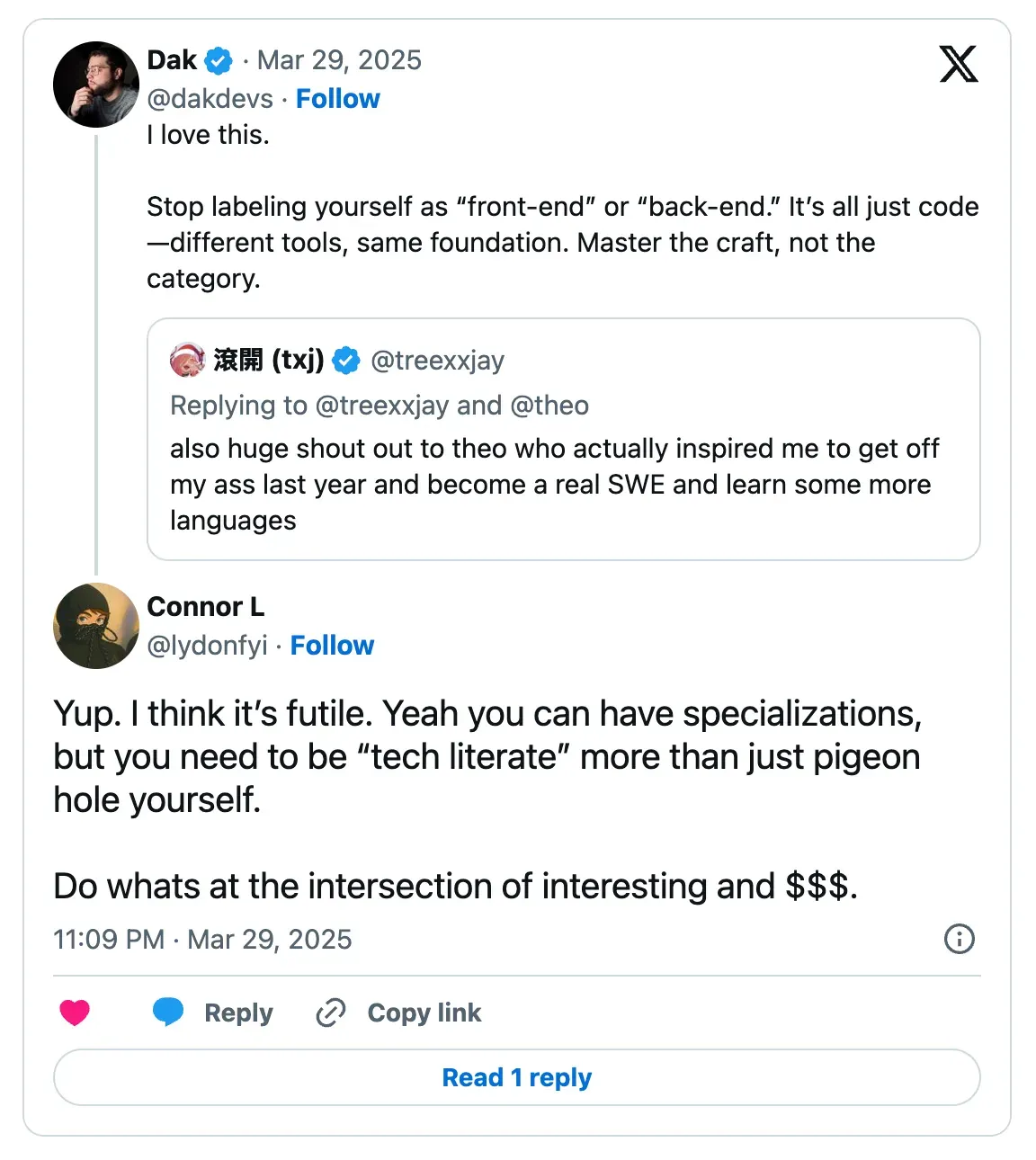7 months ago by Dak
My World ViewThe Specialist Trap
The toolbox changes, your thinking shouldn’t

We’ve been sold a lie about how careers work in tech. It starts the moment you introduce yourself. Think about it: how do you describe what you do? You probably say something like, "I'm a front end developer." Or maybe, "I'm a DevOps engineer." You might even drill down to, "I'm a JavaScript developer." This isn't just how you talk about yourself; it's how job boards are structured, how résumés are written, how entire careers are mapped out. It’s all about the niche.
But here's the harsh truth nobody tells you: mastering a niche is a dead end. Knowing a specific toolset inside and out feels powerful today. You learn the syntax, the framework peculiarities, the current buzzwords. You get really good at building things, but only within a tiny, predefined box. That's niche mastery.
Craft mastery is something else entirely. It means understanding how things fundamentally work. It’s the stuff that stays true across different programming languages, different architectural paradigms, and different decades. It’s knowing how to solve problems, not just where to click in a specific IDE or run a specific command. One makes you useful right now. The other makes you indispensable tomorrow, and the day after that.
Specialization can be a dangerous trap. You become incredibly proficient with your current tools. So proficient, in fact, that you stop looking up. You stop asking how things connect. You stop exploring different ways to solve similar problems. You stop learning anything truly new.
And then the ground shifts. Because tech stacks always shift. Your precious, deeply specialized toolbox suddenly looks outdated. You're left with a set of skills perfectly optimized for yesterday's world, but your brain hasn't built the flexibility to adapt. Remember when Assembly was the king? Then C showed up and changed everything. Java arrived, then JavaScript took over the web. Now folks are hyped about Rust or Go or whatever landed on the front page of Hacker News this morning. The specific tools are a revolving door. The underlying craft of building systems, understanding logic, and solving human problems with technology? That remains constant. The engineers who thrive aren't the ones stubbornly clinging to their corner. They're the ones who possess a deeper understanding of what those tools are really doing. They see the patterns, not just the syntax.
Now, the AI wave is crashing over us. You hear the same old fears: "AI will write 90% of the code." People panic. They resist. They worry about being replaced by a machine. It's the same cycle, just a new tool. Did C replace programmers who wrote Assembly? No, it empowered more people to write code. Did JavaScript kill backend development? No, it enabled an explosion of rich web applications. AI isn't coming to replace engineers who understand their craft. It's coming to lower the barrier even further, to expand the pool of what's possible, and who gets to build it.
If your entire value is tied to knowing a particular framework version or a specific cloud service configuration? You're right to feel threatened. AI will eat that niche knowledge for breakfast. But if you've mastered the underlying craft – if you know how systems work, why we choose certain approaches, and how to break down complex problems – you'll adapt faster than ever. You'll leverage AI as a tool, not fear it as a competitor.

Stop defining yourself by a narrow label. You are not "just" a React developer. You are not "just" a cloud engineer. You are a builder. You are a problem-solver. You are an engineer in the truest sense. Focus on the fundamentals. Learn how systems interact. Understand the core principles that transcend any single language or framework. Let curiosity be your guide, not the promise of the next shiny certification.
Being deeply good at one small thing is fine. But being adaptable, relentlessly curious, and guided by core principles? That's the superpower. That's the real leverage in a world that changes faster than you can update your LinkedIn profile. When the next big shift happens (and it absolutely will), you won't have to start from scratch. You'll already possess the foundation, the understanding, and the mindset that truly matters.
The age of the narrow specialist is rapidly ending. The future belongs to the adaptable craftsperson.
Enjoyed this post?
Follow me for more content like this.